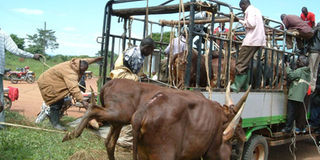Step up fight against livestock theft

What you need to know:
The issue: Livestock theft.
Our view: The authorities need to rise to the challenge and deal with livestock theft in a more robust way than is currently happening. In saying this, of course, we acknowledge that Livestock Anti-theft Unit of the police has been in a way strengthened in recent years, but its services are not available to the many smallholder livestock keepers, and to many more thousands of voiceless Ugandans who would benefit from them.
Livestock theft is one of the biggest problems that herders in different parts of the country face.
There are areas that have faced this as a perpetual problem, with livestock raiders coming from different communities and across the borders.
In Kitgum District, for instance, the local authorities have proposed that communities set up communal kraals so that the respective communities may more effectively protect their animals. Some of the residents object to the proposal, fearing that the measure could catalyse disaster in case of a disease outbreak.
The residents of Kitgum suspect that their cows and goats are stolen by raiders from South Sudan and Karamoja.
In other parts of Uganda, the story is slightly different. Take central Uganda as an example. There have been multiple incidences of livestock theft in recent weeks. Thieves usually come under the cover of night darkness, especially when it rains. Some come during day when the livestock tenders are away.
They often slaughter the animals and pack the meat in saloon cars. Some take away live animals, again forced into saloon cars.
If one did a random check among livestock keepers, the fear of their animals being stolen ranks very high up among the challenges they face. To many it is the biggest single challenge, not diseases or lack of water and pasture.
Many livestock keepers have their animals as their most precious assets, apart from their land and the houses they sleep in. the animals being stolen, therefore, poses the real danger of pushing the affected families into despicable poverty. There is a story of an old man in Wakiso District who woke up in the morning to find all his cows gone, taken by thieves. He slumped into depression and died a few months later.
This is why the authorities need to rise to the challenge and deal with livestock theft in a more robust way than is currently happening. In saying this, of course, we acknowledge that Livestock Anti-theft Unit of the police has been in a way strengthened in recent years, but its services are not available to the many smallholder livestock keepers, and to many more thousands of voiceless Ugandans who would benefit from them.
This issue needs to be raised, and raised very loudly, so that robust and inventive means are devised to stop livestock theft. To begin with, each police chief should have to take charge of their area and work with locals to ensure that this happens.




